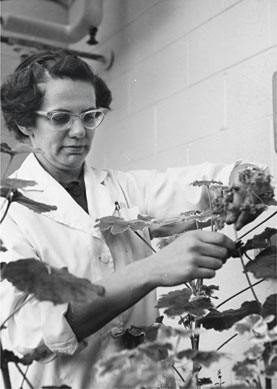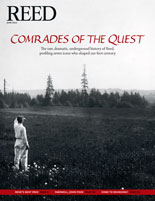
IRIS login | Reed College home Volume 91, No. 2: June 2012
Centennial Campaign
Bio Prof Bequeaths Fortune to Reed
By Randall S. Barton

The late professor Helen Stafford [biology 1954–87] bequeathed an astonishing $8 million to Reed in her will. The bulk of the gift will provide financial aid; $1 million will support the biology department.
Born in Philadelphia in 1922, Helen attended Wellesley on a scholarship, studying botany. She wrote a groundbreaking master’s thesis on grass seedlings at Connecticut College for Women, earned a PhD for her discoveries about plant enzymes at the University of Pennsylvania, and taught at the University of Chicago, where she caught the attention of Lewis Kleinholz [1946–1980], who recognized that Reed would benefit from her exemplary teaching and innovative research.
After coming to Reed as the college’s first female professor in the sciences in 1954, Helen and her colleagues laid the groundwork for what became one of the top undergraduate biology programs in the U.S. “Helen was a quiet but inspiring person and a very fine teacher,” says Robert McNair Scott ’61, who worked for Helen as a teaching lab assistant. “She was an incredible woman who opened many doors, both to her students and to her gender.”
Anne Wood Squier ’60 also taught labs for Helen. “Nothing got in the way of the absolute precision of Helen’s experimental methods, and she had a passion for new knowledge,” Anne says. “She found her niche at Reed, where she could teach bright students and get a lot of satisfaction from pointing them down various pathways, and continue to do her work at a very high level.”
In addition to being a Guggenheim Fellow, Helen consistently broke new ground with her work on aromatic compounds, flavonoids, and proanthocyanidins, writing more than 70 journal articles.
At a time when there were few highly recognized women scientists, Helen served as a role model. “We all knew Helen was exceptional,” says Pamela Ronald ’82, a professor of plant pathology at UC Davis. “She was definitely a pioneer, and we figured if she could do it, well, then, why couldn’t we? She was one of those professors who really gripped my imagination and made me believe in the power of the individual, that one person can make a difference.”
Living frugally, Helen endowed the $1 million Morton O. Stafford Jr. scholarship at Reed in memory of her brother, who was killed in World War II. She savored her work and continued advising thesis students years after she retired in 1987.
Some years later, Helen was diagnosed with Alzheimer’s. Mary Potts, Helen’s caregiver, remembers visiting Reed’s campus with Helen and her faithful dog, Brownie.
“Reed was her life,” says Mary. “She just loved it and came in five days a week to walk around campus.” Following her wishes, Helen’s ashes were scattered on the shore of Reed Lake near the blue bridge that she loved. Her legacy of scholarship, both as a teacher and in providing opportunities for future students, insures she will be a part of Reed’s future.


LATEST COMMENTS
steve-jobs-1976 I knew Steve Jobs when he was on the second floor of Quincy. (Fall...
Utnapishtim - 2 weeks ago
Prof. Mason Drukman [political science 1964–70] This is gold, pure gold. God bless, Prof. Drukman.
puredog - 1 month ago
virginia-davis-1965 Such a good friend & compatriot in the day of Satyricon...
czarchasm - 4 months ago
John Peara Baba 1990 John died of a broken heart from losing his mom and then his...
kodachrome - 7 months ago
Carol Sawyer 1962 Who wrote this obit? I'm writing something about Carol Sawyer...
MsLaurie Pepper - 8 months ago
William W. Wissman MAT 1969 ...and THREE sisters. Sabra, the oldest, Mary, the middle, and...
riclf - 10 months ago